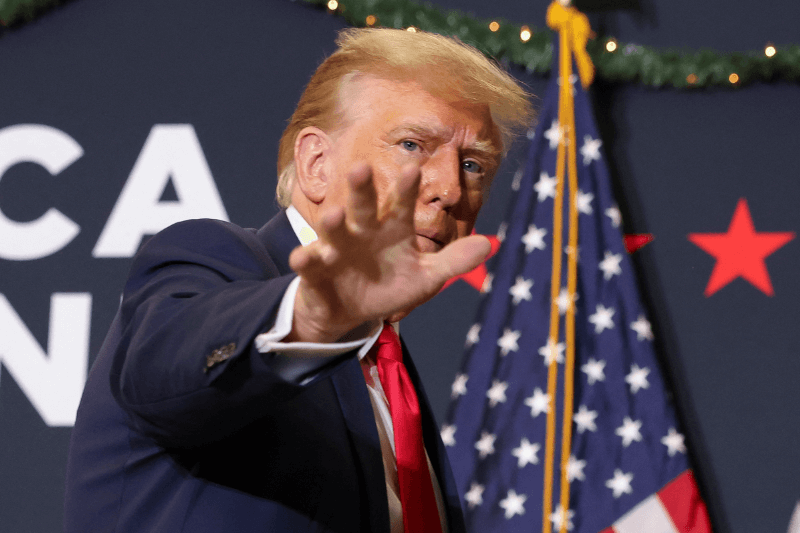
Trump’s Astonishing Comeback: From Legal Woes to GOP Primacy
Former President Turns Indictments Into Rallying Cry, Shaping Republican Primary Dynamics
In an unexpected twist of political prowess, Donald Trump has staged a remarkable comeback, transforming legal vulnerabilities into a driving force that propels him to the forefront of the Republican primary race. From a lackluster kickoff speech marred by midterms fallout and criminal investigations, Trump has emerged as the undisputed favorite, seizing control of the GOP narrative with a disciplined campaign, disarray among opponents, and vulnerabilities in the Biden administration.
Trump’s defiance in the face of 91 criminal charges, ranging from hush money payments to election interference, has become a central theme in his campaign, resonating strongly with his base. At a recent rally in New Hampshire, Trump proudly declared, “I consider it a great badge of honor because I am being indicted for you,” a sentiment echoed by fervent supporters.
As the primary contests loom, Trump’s dominance is evident, fueled by the failure of GOP rivals like Ron DeSantis and Nikki Haley to unify around a coherent message or candidate. Trump’s political machinery, more refined and strategic than ever, has deftly navigated the landscape, altering contest rules, securing supportive delegates, and applying pressure on Republicans to rally behind him.
While Trump’s legal battles pose a potential risk of multiple trials during the campaign, they paradoxically solidify his support within the Republican base, right-wing media, and elected officials. The opposition’s attempts to cast doubts on Trump’s electability have faltered, especially given Biden’s waning popularity and polls showing Trump surging nationally and in early states.
Keep Reading
In December, Trump’s average support among Republican primary voters skyrocketed to 61%, up from 42% in February, showcasing a remarkable consolidation of his base. Even former detractors, like the Club for Growth, once vehemently against Trump, have sought a détente, recognizing the inevitability of his nomination.
Trump’s campaign, initially beleaguered by internal strife and a post-midterm slump, underwent a strategic overhaul. Recognizing the need to balance exposure, the team orchestrated a shift from mega-rallies to smaller, more intimate events, bringing Trump closer to his supporters.
The first criminal indictment, concerning hush money payments, unexpectedly fueled sympathy within the Republican ranks. Trump’s team capitalized on this, rallying prominent figures and media outlets to his defense, creating a narrative of political persecution that resonated with voters.
The primary battle took a decisive turn when Trump, identifying Ron DeSantis as a potential threat, initiated a relentless onslaught against him. Despite advice against immediate attacks, Trump’s campaign pummeled DeSantis with disparaging nicknames and a barrage of allegations, leaving the Florida governor struggling to gain traction.
Efforts to counter Trump’s surge within the Republican Party faced considerable challenges. Messaging strategies, ranging from highlighting criminal justice issues to policy comparisons, failed to sway Trump’s unwavering base. Even attacks on his unfulfilled campaign promises, controversial statements, and policy shifts towards transactional populism seemed ineffectual.
External groups, like the Club for Growth and Americans for Prosperity Action, attempted to find chinks in Trump’s armor, spending millions on campaigns highlighting potential vulnerabilities. However, these efforts fell flat, with polls showing Trump’s favorability largely unaffected.
As Trump’s dominance solidifies, his campaign’s early groundwork in key states becomes crucial. Trump operatives strategically navigated party rules, securing advantages in delegate selection processes across various states, particularly California, a pivotal battleground.
Yet, the specter of legal challenges looms large over Trump’s campaign. Court battles over his eligibility to run, potential disqualification in certain states, and the question of immunity for actions during his presidency add uncertainty to an otherwise triumphant trajectory.
As the 2024 Republican primary unfolds, Trump stands on the precipice of a political resurrection, transforming legal troubles into a rallying cry for his base. The next chapters of this high-stakes political drama will undoubtedly shape the course of the GOP and test the resilience of Trump’s remarkable comeback.




